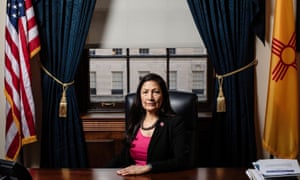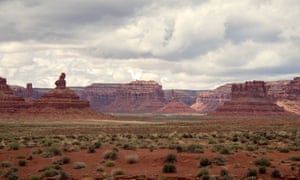‘It’s my homeland’: the trailblazing Native lawmaker fighting fossil fuels
The Guardian
Deb Haaland, one of the first Native American women elected to Congress, has become a powerful voice for US public lands

While she was campaigning for a seat in the US Congress last year, Deb Haaland went camping for four days. It was less a surprisingly timed vacation and more a return home.
Her destination was notable: Utah’s Bears Ears national monument, which Donald Trump controversially downsized in 2017 as part of a bid to encourage resource extraction. She wanted to experience “a living landscape” where the art and artifacts of her people, the indigenous Pueblo, are still abundant. She spent the trip hiking in and out of steep canyons and marveled at the area’s famed Moon House, a cliff dwelling and storage facility that dates back 800 years.
“There are some pretty amazing ruins there, and you know, I don’t even like to call them ruins,” Haaland says, “because in our culture, in Pueblo culture, if you acknowledge our ancestors, they are there. The spirit of the people never leaves.”
Haaland has now become a powerful advocate for US public lands in the face of the Trump administration. In November, Haaland, a member of the Laguna Pueblo tribe, won her New Mexico seat, becoming one of the first two Native American women ever elected to the US House of Representatives. (The other, Sharice Davids, is a Kansas congresswoman who belongs to the Ho-Chunk nation.)

“My ancestors migrated to what is now New Mexico, where the Pueblo Indians live, back in the late 1200s,” Haaland told the Guardian in a recent interview. “No one else can claim that they have been there any longer than our people, than the Pueblo people. I feel like perhaps my voice is important right now to testify to our longstanding care for the land.”
With Haaland in office, “we now have a Native American right there in the decisionmakers’ room,” said Shaun Chapoose, the co-chair of the Bears Ears Inter-Tribal Coalition and a member of the governing body of the Ute Indian tribe. “She is a Native American and she understands our traditions and she is in a place where she can educate lawmakers.”
She understands, for instance, that almost every parcel of public land in the US is land that Native peoples have inhabited or used for material and spiritual purposes. When the United States government used violence and coercion to force indigenous tribes on to reservations, Native people did not suddenly lose their connection to it.
“Our sacred sites are all over the public lands,” said Haaland.
Bears Ears, home to thousands of indigenous ancestral sites, is a prime example. In December 2017, in response to the desires of conservative pressure groups and oil, gas and mining interests, the Trump administration announced that it would drastically shrink the boundaries of the monument, which the Obama administration established in late 2016. The move was an affront to the many Native American tribes, including the Navajo, Ute and Hopi people, who had advocated for years for the monument’s creation in order to protect their heritage.
“Trump turned around and basically told the tribes, ‘hey, you ain’t got no say, just sit there and take what I give you,’” said Chapoose.
After joining Congress, Haaland was made the vice-president of the House committee on natural resources, a key legislative body that crafts environmental laws and has jurisdiction over critical issues like climate change. It was a plum position for someone in office only a few weeks.
Haaland dove almost immediately into the fight over Bears Ears, denouncing the monument downsizing during hearings on Capitol Hill and cosponsoring bills that would restore protections to Bears Ears and prevent the executive branch from shrinking or abolishing national monuments in the future.
Given Republican control of the Senate and the White House, these bills have a murky future.
Bears Ears and the broader south-west, Haaland says, are “my homeland. It is proper for me to want to protect it.” She feels similarly about New Mexico’s Chaco Canyon national historic park, the site of a high-desert indigenous settlement that was a major center of Pueblo culture dating back to 850 AD.

Today, the park is threatened with a rash of proposed oil and gas development on nearby lands, and Haaland isn’t happy about it. In April, she helped lead a congressional delegation to the site to build support for a bill she is cosponsoring that would ban all oil and gas drilling within a 10-mile radius of the park. Haaland and her colleagues toured the park’s abundant ancient dwellings and used infrared cameras to observe the plumes of methane that adjacent oil and gas drilling constantly leaks into the air.
“I just feel like our priorities are so messed up right now,” she said. “We need to protect every single open space that we possibly can,” including Chaco, Bears Ears and more.
Haaland’s work on behalf of the public lands is not solely about protecting indigenous sacred sites. She is also deeply concerned about the climate crisis.
Tom Solomon, a co-coordinator for the climate group 350 New Mexico,said that Haaland “has been a pretty fierce climate advocate for a long time”. Before she went to Washington DC, Solomon says Haaland was “instrumental” in building bridges between the environmental movement and indigenous communities in New Mexico in support of legislation that commits public utilities in the state to stringent clean and renewable energy standards by 2045. That legislation, called the Energy Transition Act, was signed into law in New Mexico in March 2019.
Haaland says she would ultimately like to see fossil fuel development phased out completely on the federal domain. “I am wholeheartedly against fracking and drilling on public lands,” she said. She is also a staunch supporter of the Green New Deal, a nascent plan to rapidly end America’s reliance on fossil fuels, restore its ecosystems and rebuild its infrastructure.
“Public lands are a statement about who we are as Americans,” Haaland said. “The most pristine and beautiful places in our country should never belong to one person.”
At this critical time…
…we can’t turn away from climate change. For The Guardian, reporting on the environment is a priority. We give reporting on climate, nature and pollution the prominence it deserves, stories which often go unreported by others in the media. At this pivotal time for our species and our planet, we are determined to inform readers about threats, consequences and solutions based on scientific facts, not political prejudice or business interests. But we need your support to grow our coverage, to travel to the remote frontlines of change and to cover vital conferences that affect us all.
More people are reading and supporting our independent, investigative reporting than ever before. And unlike many news organisations, we have chosen an approach that allows us to keep our journalism accessible to all, regardless of where they live or what they can afford.
The Guardian is editorially independent, meaning we set our own agenda. Our journalism is free from commercial bias and not influenced by billionaire owners, politicians or shareholders. No one edits our editor. No one steers our opinion. This is important as it enables us to give a voice to those less heard, challenge the powerful and hold them to account. It’s what makes us different to so many others in the media, at a time when factual, honest reporting is critical.
Every contribution we receive from readers like you, big or small, goes directly into funding our journalism. This support enables us to keep working as we do – but we must maintain and build on it for every year to come. Support The Guardian from as little as $1 – and it only takes a minute. Thank you.

.png)







Follow Us!